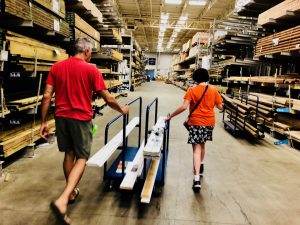Learning Social Graces Takes Time
Written by |

She saw him from across the room. I’m sure everyone in the restaurant did. However, the difference was Jess wanted to meet the young man while the other patrons tried not to notice him. As far as Jessie was concerned, a person being on the spectrum is not a barrier but rather what makes them a person of interest — she could relate to him.
Jess isn’t the easiest person to connect with, either. When people try too hard to engage, she shies away and ignores their attention. Unfortunately, she doesn’t practice what she preaches — her social skills are erratic.
There’s a part of our church service where we are to greet the people we are sitting next to. Jess doesn’t always look at the person, but now she will shake hands. This is of her own doing and not something I force her to do. Some of the people are familiar to her and others are not. Regardless, she’s starting to enjoy the ritual.
When the sermon is over, we typically split. Often, this is either because she is restless, or we have a full day planned. Last Sunday, while we lingered to talk to friends, Jess waived to a young man standing behind us. He came over to say hello, and this pleased her immensely. This is what you are “supposed to do,” welcome guests and talk to people you don’t know. We learned that he was church shopping and this was his second visit. We also learned he teaches math.
On our way out, Jess saw another young man standing by the exit. Boosted by her newly formed confidence, she ran up to him like a fan to a rock star. The poor guy. He was polite but didn’t know what to do. I get it. Her excitement was a bit over the top. Maybe there’s a movie she can watch that models how to act cool? (If anyone knows of one, let me know.) What Jess needs to do is rely on her Talker in these situations, and we should practice roleplaying. Jess isn’t a girl who likes to work off of a script. All that school testing has soured her, so she will shut down.
As for talking to boys, I guess it’s time to have that conversation about not acting too interested. It tends to scare boys off. I’m sure she will grow out of the giddy-teenage-girl stage. I don’t doubt she’ll listen to what I have to say, but learning to contain her exuberance will be a challenge.
Over time, her demeanor in public has improved, and she’s blending in more. (We don’t like drawing attention to ourselves for the wrong reasons. Yes, this is stating the obvious.)
We make a point of being out and about as much as possible; going out to eat, shopping, and running errands. The more experiences she has, the more confident she becomes and the better her social graces become. They will not improve without practice. Someday, I hope Jess is independent enough that she can order a meal for herself just like the young man we saw at Chick-fil-A. She has a lot to figure out between now and that time, but having a goal is the first step toward making it happen.
To read more about our journey, visit my blog. We wouldn’t even have a story if Jess hadn’t found her AAC voice. Also, check Angelman Syndrome News on Fridays for my upcoming columns.
***
Note: Angelman Syndrome News is strictly a news and information website about the disease. It does not provide medical advice, diagnosis, or treatment. This content is not intended to be a substitute for professional medical advice, diagnosis, or treatment. Always seek the advice of your physician or other qualified health providers with any questions you may have regarding a medical condition. Never disregard professional medical advice or delay in seeking it because of something you have read on this website. The opinions expressed in this column are not those of Angelman Syndrome News, or its parent company, Bionews Services, and are intended to spark discussion about issues pertaining to Angelman syndrome.








Leave a comment
Fill in the required fields to post. Your email address will not be published.